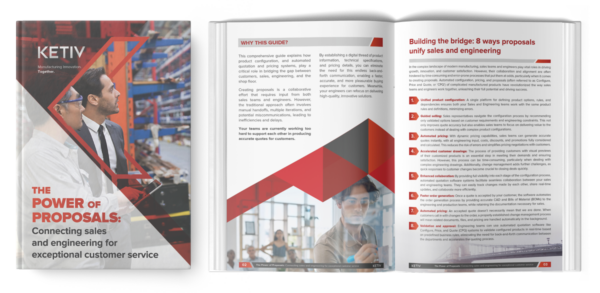In today’s competitive business landscape, integrating Customer Relationship Management (CRM) systems with Configure, Price, Quote (CPQ) solutions can significantly streamline and enhance the sales process. A CPQ system automates product configuration, pricing, and quote generation, ensuring accurate and tailored quotes that meet customer needs. By automating these tasks, sales teams can focus more on building relationships and closing deals.
On the other hand, Enterprise Resource Planning (ERP) systems help to centralize business processes, manage inventory, and streamline production, thus enhancing operational efficiency and improving order fulfillment. When ERP systems are integrated with CPQ software, the synergy can transform both sales and operational workflows. This blog covers what ERP integration entails and why integrating ERP with a CPQ platform is essential for manufacturers to get to market faster and enhance their workflows.
What is ERP Integration?
Centralized Data Management:
ERP integration combines data from various departments, such as sales, finance, and manufacturing, into a single system. This centralization allows for easy access and management of data, ensuring that all departments work with the same information.
Real-Time Information Sharing:
With ERP integration, real-time data updates are shared across all integrated systems. This ensures that everyone in the organization has the latest information, leading to more accurate and timely decision-making.
Improved Efficiency:
Automating processes and reducing manual data entry saves time and minimizes errors. This improved efficiency allows employees to focus on more strategic tasks rather than getting bogged down with administrative duties.
Enhanced Decision-Making:
By consolidating data from different sources, ERP systems provide comprehensive insights that aid in informed decision-making. Managers and executives can analyze integrated data to identify trends, opportunities, and potential issues, leading to better strategic planning.
Free eBook
The Power of Proposals: Connecting sales and engineering for exceptional customer service
Accelerate the sales process for customers while enhancing workflows for your workforce. Your teams are currently working too hard to support each other in producing accurate quotes for customers.
By establishing a digital thread of product information, technical specifications, and pricing details, you can eliminate the need for this endless back-and-forth communication, enabling a faster, accurate, and more pleasurable buying experience for customers. Meanwhile, your engineers can refocus on delivering high-quality, innovative solutions.
Why Integrate ERP with CPQ?
Integrating ERP with CPQ systems offers numerous benefits that enhance both sales and operational efficiency. Here are key reasons why this integration is important:
Automated Quote-to-Cash Process:
Seamlessly transitioning from quote generation to order fulfillment reduces manual data entry and errors. This automation ensures that quotes are quickly converted into orders and invoices, speeding up the entire sales cycle.
Reduced Lead Times:
Integration improves production scheduling and inventory management, resulting in a faster quoting process and delivery time. By having a real-time view of inventory levels and production capacity, businesses can better plan and meet customer demands.
Enhanced Data Accuracy:
Synchronizing product and pricing data between a CPQ system and an ERP system ensures consistent and accurate quotes. This synchronization eliminates discrepancies that can lead to customer dissatisfaction or order delays.
Improved Order Fulfillment:
Coordinating sales and operations enhances order processing and the customer experience leading to a higher customer satisfaction rate. Integrated systems enable better communication and collaboration between departments, leading to more efficient order fulfillment processes.
Increased Efficiency:
Streamlining workflows and reducing the need for reconfiguring quotes due to data discrepancies boosts overall efficiency. Employees can spend less time correcting errors and more time on value-added activities.
Popular ERP Software for Integration
When considering ERP integration, it’s important to choose the right software that aligns with your business needs. Some popular ERP software options include:

Each of these ERP solutions offers unique features and capabilities that can be leveraged to integrate well with your CPQ solution. Selecting the right ERP system depends on your specific business requirements and goals.
Common Use Cases of ERP-CPQ Integration
- Streamlined Production Scheduling
- Scenario: A manufacturer receives a complex order with specific configuration requirements.
- Benefit: The order details are automatically transferred to the ERP system, enabling accurate and timely production scheduling. This reduces delays and optimizes resource allocation.
- Accurate Inventory Management
- Scenario: A company needs to manage inventory for customizable products.
- Benefit: Integration ensures that inventory levels are updated in real-time as quotes are generated and orders are confirmed. This prevents stockouts and overproduction, ensuring efficient inventory management.
- Error-Free Order Processing
- Scenario: A manufacturing firm handles a high volume of orders with varying configurations.
- Benefit: Integrating CPQ with ERP eliminates manual data entry errors by automatically syncing quote details with the ERP system, ensuring orders are processed correctly and efficiently.
- Faster Delivery Times
- Scenario: A manufacturer aims to meet tight delivery deadlines for custom orders.
- Benefit: Real-time data synchronization between CPQ and ERP systems enables better coordination between sales and production teams, leading to quicker production cycles and faster delivery times.
- Enhanced Customer Satisfaction
- Scenario: A company wants to improve its customer service by providing accurate quotes and timely deliveries.
- Benefit: Integration allows sales teams to provide precise quotes based on real-time ERP data, ensuring that customers receive accurate information and timely product deliveries, which boosts customer trust and satisfaction.
- Efficient Change Management
- Scenario: A customer requests a change to an order after the initial quote.
- Benefit: Integrated systems enable easy updates to quotes and production schedules, ensuring that changes are quickly reflected in both the sales and manufacturing processes, minimizing disruptions.
Conclusion
CPQ ERP integration is a strategic move that can drive significant improvements in sales and operational efficiency. By automating processes, centralizing data, and enhancing real-time information sharing, businesses can achieve greater accuracy, reduced lead times, and improved customer satisfaction. As you consider ERP implementation or integration, carefully evaluate the available software options to find the best fit for your organization. The right integration can transform your sales process, streamline operations, and ultimately, contribute to long-term business success.

